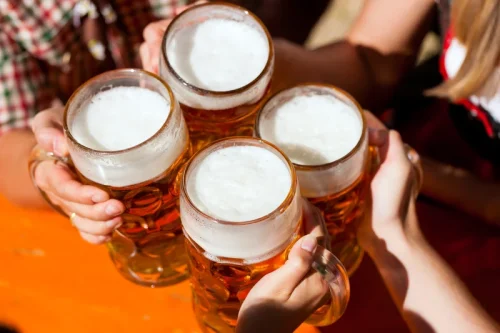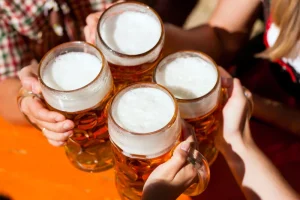
HDL is considered “good” cholesterol while LDL is classified as “bad” cholesterol, a buildup of which can be a contributing factor in a heart attack. So, in a sense, alcohol can help to create a healthy balance of good cholesterol versus bad cholesterol, further Drug rehabilitation lowering the odds for a heart attack or stroke. They can help develop personalized treatment plans, which may include detoxification, therapy, counseling, and support to overcome alcohol addiction.

Can alcohol interact with blood-thinning medications?

Banyan has been helping people with addictions in communities across the nation achieve long-term sobriety, and you can be one of them. Explore drug rehab program durations, from short-term to long-term options, tailored to individual needs. Find the right plan for lasting recovery and sustainable sobriety. A man’s blood typically thins if he drinks two (two ounces of liquor) or more daily. These amounts may vary, depending on a person’s alcohol tolerance. A person needs to speak with a doctor about taking blood thinners safely.

How Can I Reduce Blood Clots?
- However, those already dealing with blood-pressure-related illnesses and heart conditions should only drink in moderation.
- Light drinking (one or two drinks) can lower your blood pressure, but that doesn’t mean it’s good for you.
- Two key factors affected by alcohol consumption are platelets and blood vessels.
- This is a common reason people get a blood thinner prescribed by their doctor.
- By reducing the likelihood that these blood cells will stick together and form a clot, alcohol may then “thin” the blood and help to prevent cardiac complications.
- Doing this can increase the risk of severe bleeding due to an accident or injury.
One drink on occasion is not likely to cause problems, but moderate to heavy drinking with anticoagulant medications is dangerous. It increases the risk of bleeding-type strokes as well as blood loss from what would otherwise be a small injury. It can also make it more difficult for the body to form a blood clot. When you drink alcohol, does alcohol thin or thicken blood it reduces the ability of your blood to clot.
- Kendra would need to consult her doctor about taking any blood thinners.
- Abstain from alcohol while you are taking an anticoagulant or blood thinner.
- When a blood clot blocks the flow of blood to your heart, a heart attack can occur.
- About 70% travel freely while the remaining 30% stay in your spleen, where they are stored.
Don’t Risk The Effects Of Alcohol Abuse

Binge drinking, particularly when you do it multiple times per week, is where many of the larger risks come into play. Consistently consuming four or more drinks (for men) or three or more drinks (for women) several days each week can cause you to create dangerous clots. It reduces platelet counts and the stickiness of your blood, preventing clot formation. Some research even indicates that a drink a day may lower the risk of a stroke for some patients, but the opposite is also true for those who drink too much.
Healthline Lessons
When it comes to taking any medications, always be sure to speak to your doctor about drinking and using other medications. Drinking to excess can lead to injuries, alcohol poisoning, violence, stillbirth/miscarriage, and risky sexual acts (sex with multiple partners, unprotected sex, etc.). Unprotected sex can lead to sexually transmitted diseases, such as HIV, or an unintended pregnancy. However, blood that is too thin won’t clot when it’s supposed to. People with thinner blood bruise more easily, their cuts and other wounds heal more slowly, and their platelets break down more often than other people’s and so need replaced more often. Autoimmune disorders, such as systemic lupus erythematous or rheumatoid arthritis can cause this.
- Alcohol Addiction Center is a free, web-based resource helping to bring education and information to the world of alcohol addiction.
- It helps to convert fibrinogen into fibrin, a protein that forms a mesh-like structure that helps stop bleeding.
- The American Heart Association doesn’t recommend drinking alcohol solely to protect your blood vessels and improve your circulation.
- Not only does alcohol thin your blood, but long-term alcohol abuse can also increase your risk of conditions ranging from diabetes to liver disease to cancer.
- Because alcohol depresses your CNS, you might not respond as quickly as you should if your start losing large amounts of blood while on a blood thinner.

Drinking alcohol while on blood thinners can strain the liver, potentially affecting its ability to metabolize medications effectively. This may result in unpredictable variations in drug levels in the body. An occasional drink is likely safe for most people, though there are exceptions. For example, if you take anticoagulants such as Eliquis, Coumadin, Plavix or even aspirin, the risks far outweigh any perceived benefits or temporary enjoyment.
Long-term alcohol use can also increase the production of platelets, which also increases clot risk. Although it’s usually recommended that you do not drink alcohol on blood thinners, the safest thing for you to do is to ask your doctor if it’s safe. Yes, drinking alcohol can thin your blood because it prevents blood cells from sticking together and forming blood clots. This is why some researchers suggest that the occasional drink can actually lower your risk of ischemic strokes or strokes caused by blocked blood vessels. Because of this, you might think that drinking a moderate amount of alcohol, and being careful not to go beyond that amount, could help to keep your blood from becoming too thick.

